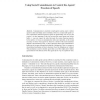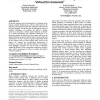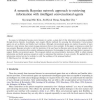557 search results - page 29 / 112 » Using Intelligent Agents to understand organisational behavi... |
130
Voted
ACOM
2006
Springer
15 years 6 months ago
2006
Springer
Communication is essential in multi-agent systems, since it allows agents to share knowledge and to coordinate. However, in open multi-agent systems, autonomous and heterogeneous a...
111
click to vote
ECAL
2007
Springer
15 years 6 months ago
2007
Springer
The “order for free” exhibited by some classes of system has been exploited by natural selection in order to build systems capable of exhibiting complex behaviour. Here we expl...
112
Voted
ESWA
2008
15 years 14 days ago
2008
DADICC is the abbreviated name for an intelligent system able to detect on-line and diagnose anomalies as soon as possible in the dynamic evolution of the behaviour of a power pla...
101
Voted
ATAL
2005
Springer
15 years 6 months ago
2005
Springer
In the past emotions have been dismissed as a distraction to the logical, scientific thought process. More recently however, the importance of emotion in human-like intelligence a...
113
click to vote
IPM
2007
15 years 9 days ago
2007
As access to information becomes more intensive in society, a great deal of that information is becoming available through diverse channels. Accordingly, users require effective ...




